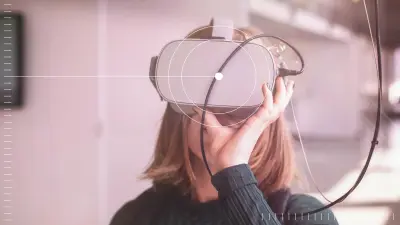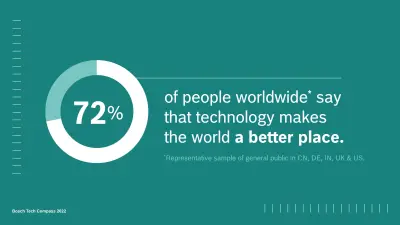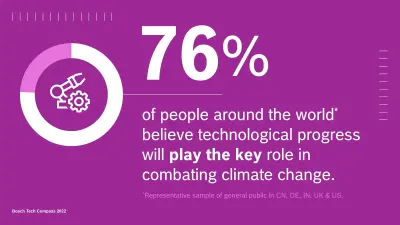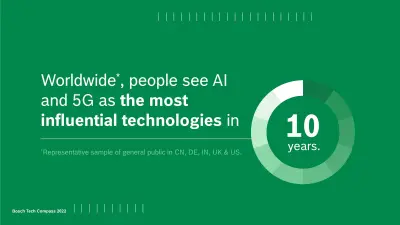What does the world think about technology?
Representative survey in China, Germany, Great Britain, India, and the US

How is technology affecting the lives of people? Bosch asked study participants around the world what they think about technological progress and what they expect from it in the future. The representative survey reveals a variety of perceptions between countries and the influence of single key technologies.
In the last two decades, computers, the internet, and smartphones became an integral part of everyday life. It is very likely that the current decade will produce technological breakthroughs that have a similarly far-reaching impact. To provide orientation and answers to open questions, Bosch created its Tech Compass 2022. It reveals current technology trends and shows what people around the world think about them.
The Bosch Tech Compass is a representative survey of the general population in China, Germany, India, the United Kingdom, and the United States. A total of approximately 8,000 people were surveyed online for it in August 2021 by Gesellschaft für Innovative Marktforschung mbH (GIM) on behalf of Bosch. The results of the survey can be downloaded as a PDF at the bottom of this web page.
Technology makes the world a better place
The vast majority of respondents worldwide (72 percent) believe that technology makes the world a better place. The positive attitude towards technological progress is most pronounced in China (87 percent) and India (83 percent) and least pronounced in Germany (51 percent). When asked about the benefits they expect from technology for themselves, the majority of people in China said they hope that technology will make their lives more comfortable (66 percent). Most people in the UK hope for better health (57 percent), in the US, for more safety (55 percent), and in India (62 percent) and Germany (51 percent) they expect it to make work easier. Aside from these individual hopes, most respondents (83 percent worldwide) agree that technology should be used to tackle the major challenges of our time rather than serving individual needs.

A remedy for climate change

More than three out of four respondents worldwide believe that the future technological progress will play the key role in combating climate change. Therefore, it is not surprising that the majority (40 percent) considers climate engineering as the technology with the best contribution to society, followed by biotechnology (38 percent) and hydrogen as well as AI (both 35 percent). But when it comes to the question of which technologies will drive sustainability most in the future, there are regional differences: While the western countries overwhelmingly view green technologies such as hydrogen as most promising, people in China and India consider AI to have the greatest potential. On a global base, however, every second respondent thinks that technological progress is being used sufficiently to tackle the major problems of our time.
“The Bosch Tech Compass shows that people want technology that addresses the problems of our time. Technology should support us, make life easier overall, and make the world a better place. This is why we at Bosch are committed to technology that is ‘Invented for life’ and serves people.”
Top three technology trends
According to all respondents worldwide, the list of technology trends with the most future relevance is clearly dominated by AI (43 percent) and 5G (42 percent). Particular relevance is attributed to AI and 5G in China and India, while — in contrast to Asia — more relevance is attributed to self-driving cars in western countries, which ranked third (with 28 percent) on the global index. When asked whether they would prefer to beam from one place to another or take the car, around two-thirds of respondents in the West and India said they would prefer to drive. Only in China did the two modes of transportation balance each other out.





